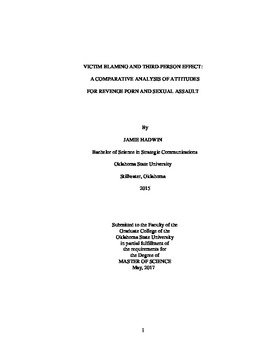| dc.contributor.advisor | Nichols, Cynthia | |
| dc.contributor.author | Hadwin, Jamie | |
| dc.date.accessioned | 2018-03-13T18:15:44Z | |
| dc.date.available | 2018-03-13T18:15:44Z | |
| dc.date.issued | 2017-05-01 | |
| dc.identifier.uri | https://hdl.handle.net/11244/54533 | |
| dc.description.abstract | Over the past decade, awareness for sexual assault prevention and education has been raised through national media coverage and programming for college students by a growing number of universities nationwide. While this is an important step in combating sexual violence, the phenomenon of revenge porn is quickly becoming recognized as an emerging form of digital sexual violence as more people are having their private and intimate images shared publicly as their own online and digital activities increase. This thesis study sought to understand how the populations� current familiarity and awareness about the revenge porn phenomenon influenced the populations� perceptions about revenge porn and its victims. A total of 206 participants, including college students at a public Midwestern university and participants on social media platforms, responded to an online survey with a series of quantitative items examining knowledge levels, exposure to information, myth acceptance, and blameworthiness for revenge porn. Participant responses were analyzed through independent and paired-samples t-tests and analysis of variance tests. Consistent with examined literature, participants with lower knowledge levels and exposure to information about both revenge porn and sexual assault reported higher victim blaming attitudes and myth acceptance for both topics and vice versa. Blameworthiness and myth acceptance were also examined through a third-person effect perspective to determine if perceived influences for self and others regarding media effects for revenge porn and sexual assault affected victim blaming attitudes, and the results indicated that third-person effect had stronger effects regarding revenge porn over sexual assault, and those stronger effects correlated with higher levels of victim blaming and myth acceptance for revenge porn than with sexual assault. These findings suggest that increased awareness for sexual assault has been effective in reducing victim blaming attitudes for sexual assault, and with more awareness, victim blaming attitudes for revenge porn can see similar reductions. | |
| dc.format | application/pdf | |
| dc.language | en_US | |
| dc.rights | Copyright is held by the author who has granted the Oklahoma State University Library the non-exclusive right to share this material in its institutional repository. Contact Digital Library Services at lib-dls@okstate.edu or 405-744-9161 for the permission policy on the use, reproduction or distribution of this material. | |
| dc.title | Victim Blaming and Third-person Effect: A Comparative Analysis of Attitudes for Revenge Porn and Sexual Assault | |
| dc.contributor.committeeMember | McKinnon, Lori | |
| dc.contributor.committeeMember | Shipka, Daniel | |
| osu.filename | Hadwin_okstate_0664M_15165.pdf | |
| osu.accesstype | Open Access | |
| dc.description.department | Mass Communications | |
| dc.type.genre | Thesis | |
| dc.type.material | text | |
